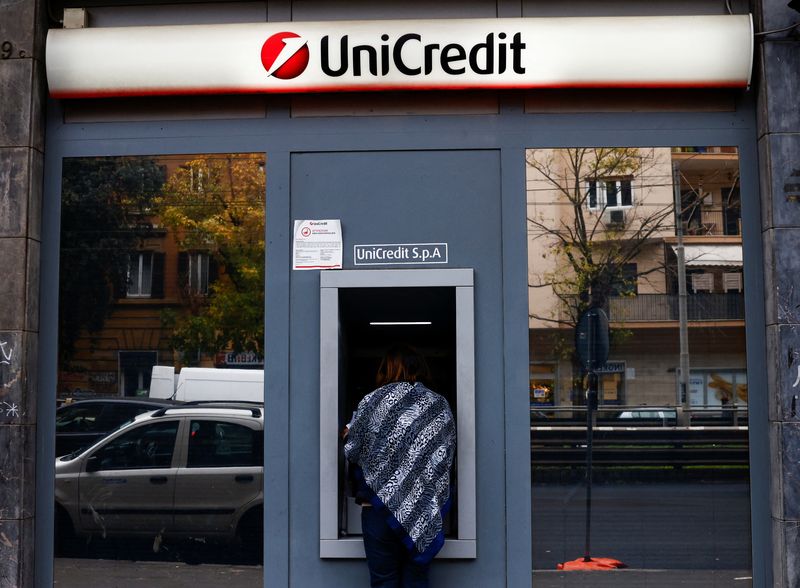By Tom Sims, John O’Donnell and Valentina Za
MUNICH/FRANKFURT/MILAN (Reuters) -Just days before UniCredit CEO Andrea Orcel set his sight on a takeover target in Italy, more evidence emerged of fierce resistance to his interest in German flagship lender Commerzbank (ETR:CBKG).
A group of customers from Germany’s corporate elite pleaded with Commerzbank’s CEO to reject a deal, according to people involved in the meeting at the bank’s Frankfurt headquarters, underscoring the depth of opposition.
They warned Germany’s second-largest bank would face the same fate as a Bavarian bank HVB, which UniCredit bought in 2005 and subsequently overhauled and scaled back.
On Monday, Orcel switched his focus to his home market with a 10 billion euro ($10.5 billion) offer for smaller Italian rival Banco BPM, saying this deal would take precedence over any potential move for Commerzbank.
Orcel had caught the German establishment off guard by discreetly building a substantial stake in the German lender.
Its announcement in September prompted backlash from politicians, industry and unions.
They warned of potential job losses and detrimental effects a takeover might have on lending to small and medium-sized companies, or Mittelstand, the backbone of Europe’s biggest economy, athough some lobbies were more guarded.
Some in Germany, including finance minister Joerg Kukies, see his bid as all but dead, and Orcel’s shift in focus was greeted with guarded relief in Commerzbank, according to people familiar with the bank’s thinking.
Orcel may not yet be ready to throw in the towel. The consummate dealmaker is bracing for a battle in Germany that could take many months, according to one person familiar with his thinking. A smaller purchase in Italy could allow UniCredit to keep moving while working on the bigger catch.
Resistance, however, remains stiff.
Ulrich Grillo, one of the executives at the recent meeting at Commerzbank, who leads the eponymous chemical maker – a Mittelstand company – said he told the board he feared key financing decisions moving to Milan.
Another attendee, the venture capitalist Christian Miele, a scion of the family famed for its household appliances, said: “No one in the room was in favour of it.”
The meeting capped off weeks of pushback against UniCredit.
After UniCredit snapped up HVB, a bank with its roots in Munich dating back to the 1860s, it followed up by slashing the workforce by two thirds and shuttering hundreds of branches, reducing the bank to a shadow of its former self. The shrinking in HVB’s workforce accelerated under Orcel since he took over as UniCredit CEO in early 2021.
In a highly unusual move for a bank, Orcel also pushed through a change of HVB’s legal form, shedding the “AG” status which protects the independence of the board in favour of a “GmbH” legal form which allows shareholders to guide the board.
Interviews with dozens of national and local politicians, CEOs, trade union and government officials laid bare fears that Commerzbank could be a grim repeat, eroding a lender critical for Mittelstand, hardening resistance to any deal.
TURBULENT TIME
UniCredit’s swoop on Commerzbank came at a time of economic and political turmoil in Germany, with the economy grinding to a halt and a political vacuum in Berlin after the collapse of the governing coalition.
This stoked fears that Orcel could take advantage of Germany’s weakness to clinch a deal, fuelling concerns of a wider erosion of the country’s significance.
Boris Rhein, the premier of Commerzbank’s home state of Hesse, recently told a room of CEOs, including Commerzbank’s, that the nation’s No. 2 bank must not be allowed to be swallowed up.
“We should give wind to the sails of such a flagship and not allow it to run aground,” Rhein, who belongs to the Christian Democrats likely to lead Germany’s next coalition government, said.
From UniCredit’s perspective, HVB’s revamp has been a success – resulting in less hierarchy and faster decisions on loan approvals. All the while, HVB, in the words of Orcel, “crushed costs” – to 44 cents for every euro of income by 2023, down from 59 cents in 2005.
A senior UniCredit executive denied that decisions about the financing of German companies were made in Italy or at the group level, noting that the local decision-making process had been empowered over the last three years.
Since taking the reins at UniCredit, Orcel has focused on boosting returns, driving a near five-fold increase in its share price.
In an indication that a Commerzbank takeover for now is on the backburner, Orcel on Monday told analysts that Germany’s upcoming early elections meant “there would have been no base or ability to move in the short term. And maybe there won’t be an ability to move at all.”
“By the time we would have closed the second bid, we would have integrated the first bank,” Orcel said.
Italy’s third-largest bank Banco BPM has been on Orcel’s wish list since he became CEO. Buying Banco BPM would help UniCredit reduce the gap with Intesa Sanpaolo (OTC:ISNPY), which in 2020 leapfrogged UniCredit to become Italy’s biggest bank.
“He’s sending a message to the Germans,” said Richard Portes, professor of economics at London Business School. “He can wait for Commerzbank.”

